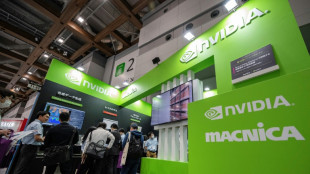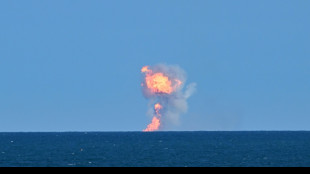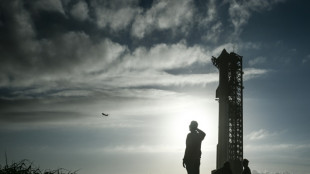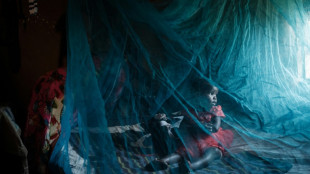
-
 Stock markets retreat ahead of Nvidia earnings
Stock markets retreat ahead of Nvidia earnings
-
Ford to cut 4,000 jobs in Europe

-
 French comedian faces victims of drug-fuelled car crash
French comedian faces victims of drug-fuelled car crash
-
General strike in Greece against cost of living

-
 Magritte painting nets auction record of $121 million
Magritte painting nets auction record of $121 million
-
Markets fluctuate as traders weigh geopolitical tensions

-
 Japanese, Koreans bottom of global love life survey
Japanese, Koreans bottom of global love life survey
-
Japan ramps up tech ambitions with $65 bn for AI, chips

-
 Taliban govt clearing 'un-Islamic' books from Afghanistan shelves
Taliban govt clearing 'un-Islamic' books from Afghanistan shelves
-
Asian markets struggle as traders weigh geopolitical tensions

-
 Iraq holds its first census in nearly 40 years
Iraq holds its first census in nearly 40 years
-
SpaceX fails to repeat Starship booster catch, as Trump watches on

-
 European powers, US seek to censure Iran at UN nuclear watchdog board
European powers, US seek to censure Iran at UN nuclear watchdog board
-
SpaceX fails to repeat Starship booster catch, as Trump looks on

-
 European stocks fall on Ukraine-Russia fears, US focused on earnings
European stocks fall on Ukraine-Russia fears, US focused on earnings
-
Trump names China hawk Howard Lutnick commerce secretary

-
 SpaceX set for Starship's next flight -- with Trump watching
SpaceX set for Starship's next flight -- with Trump watching
-
Top-selling daily French daily Ouest-France stops posting on X

-
 Russian invasion toll on environment $71 billion, Ukraine says
Russian invasion toll on environment $71 billion, Ukraine says
-
New Botswana leader eyes cannabis, sunshine to lift economy

-
 China's Xi urges 'strategic' ties in talks with Germany's Scholz
China's Xi urges 'strategic' ties in talks with Germany's Scholz
-
COP29 negotiators strive for deal after G20 'marching orders'

-
 Walmart lifts full-year forecast after strong Q3
Walmart lifts full-year forecast after strong Q3
-
Son of Norwegian princess arrested on suspicion of rape

-
 US lawmaker accuses Azerbaijan in near 'assault' at COP29
US lawmaker accuses Azerbaijan in near 'assault' at COP29
-
Spain royals to visit flood epicentre after chaotic trip: media

-
 French farmers step up protests against EU-Mercosur deal
French farmers step up protests against EU-Mercosur deal
-
Burst dike leaves Filipino farmers under water

-
 Markets rally after US bounce as Nvidia comes into focus
Markets rally after US bounce as Nvidia comes into focus
-
Crisis-hit Thyssenkrupp books another hefty annual loss

-
 Farmers descend on London to overturn inheritance tax change
Farmers descend on London to overturn inheritance tax change
-
Floods strike thousands of houses in northern Philippines

-
 SpaceX set for Starship's next flight, Trump expected to attend
SpaceX set for Starship's next flight, Trump expected to attend
-
Several children injured in car crash at central China school

-
 Urban mosquito sparks malaria surge in East Africa
Urban mosquito sparks malaria surge in East Africa
-
Many children injured after car crashes at central China school: state media

-
 Asian markets rally after US bounce as Nvidia comes into focus
Asian markets rally after US bounce as Nvidia comes into focus
-
Tens of thousands march in New Zealand Maori rights protest

-
 Five takeaways from the G20 summit in Rio
Five takeaways from the G20 summit in Rio
-
Parts of Great Barrier Reef suffer highest coral mortality on record

-
 Defiant Lebanese harvest olives in the shadow of war
Defiant Lebanese harvest olives in the shadow of war
-
Divided G20 fails to agree on climate, Ukraine

-
 Can the Trump-Musk 'bromance' last?
Can the Trump-Musk 'bromance' last?
-
US to call for Google to sell Chrome browser: report

-
 Trump expected to attend next Starship rocket launch: reports
Trump expected to attend next Starship rocket launch: reports
-
Stocks, dollar hesitant as traders brace for Nvidia earnings

-
 Biden in 'historic' pledge for poor nations ahead of Trump return
Biden in 'historic' pledge for poor nations ahead of Trump return
-
Tropical storm Sara kills four in Honduras and Nicaragua

-
 Spanish resort to ban new holiday flats in 43 neighbourhoods
Spanish resort to ban new holiday flats in 43 neighbourhoods
-
Phone documentary details Afghan women's struggle under Taliban govt

| RBGPF | -0.91% | 59.65 | $ | |
| RIO | 0.21% | 62.56 | $ | |
| BTI | 0.03% | 36.94 | $ | |
| RELX | -0.86% | 44.905 | $ | |
| AZN | -0.14% | 63.71 | $ | |
| BP | -0.38% | 28.98 | $ | |
| CMSC | 0.17% | 24.606 | $ | |
| RYCEF | -0.75% | 6.64 | $ | |
| GSK | -0.34% | 33.345 | $ | |
| NGG | -0.85% | 63.045 | $ | |
| BCC | -0.52% | 137.465 | $ | |
| JRI | 0% | 13.26 | $ | |
| BCE | -0.55% | 27.16 | $ | |
| VOD | 0.22% | 8.94 | $ | |
| CMSD | -0.18% | 24.3 | $ | |
| SCS | -0.04% | 13.085 | $ |

Nigeria's dyed cloth traders feel heat from China, inflation
Despite the rain pelting Balogun market in Lagos, Ajoke takes her time choosing the tie-dye fabric known as adire that she wants to give as a gift.
The popular textile traditionally dyed with indigo is emblematic of the culture of the Yoruba people, one of Nigeria's majority ethnic groups.
The cloth is typically used for traditional outfits often worn by Nigerians for special occasions, weddings and parties.
The 21-year-old customer slides her fingers over different brightly coloured fabrics to distinguish traditional Nigerian cotton from polyester versions made in China.
"It's not expensive," Ajoke remarked, picking up a Chinese-made fabric with purple patterns.
It costs 3,300 naira (around $2.20), half the price of a locally produced fabric.
As Africa's most populous nation grapples with high inflation that has left many struggling, Chinese counterfeit adire products have become an attractive option.
But the imported textiles are challenging the long-established clothing industry in Nigeria, producers and traders say.
The southwestern city of Abeokuta -- nicknamed the Capital of Adire -- is home to nearly 2,000 merchants and producers, according to government data.
Somodale Akomo Amosa, 86, president of the city's sprawling adire market, said she had watched helplessly as Chinese competition began about 10 years ago.
"Her income has decreased over the years. She has only sold five fabrics in 10 days," one of Amosa's daughters said.
- Competition and crisis -
Adire fabric is produced using the tie-dye technique.
Fabrics are knotted and folded by hand before being dyed to create colour gradients and shapes, said Tunde M. Akinwumi, a retired professor of African textile design and author of a book on adire.
Despite the difficulties, market chief Amosa rejects the idea of Nigerian adire producers using machines to help cut the costs of making their fabrics, as the Chinese do.
The process "would harm the tradition and originality of the products", said Amosa, one of the few adire traders who does not offer the cheaper products among their wares.
As well as competition from China, she blames the economic climate at home for preventing people from being able to buy the traditional cloth.
Nigeria is gripped by its worst cost-of-living crisis in years after President Bola Ahmed Tinubu introduced tough economic reforms when he came to power a year ago.
Ending a fuel subsidy and floating the currency are expected to reap benefits in the long term but the moves have hiked fuel and living costs and sharply devalued the naira.
Some fabrics traders like Christiana Morenikeji Ilesanmi feel they have no choice.
"You are selling more Chinese-made adire, because it's cheaper. We feel bad," said the 56-year-old, who buys from wholesalers in the megalopolis, Lagos.
"Everybody is buying it."
- Saving a 'craft' -
A few minutes' walk from the market, the main adire production centre in Abeokuta also feels the impact.
The number of visitors ordering directly from the centre is falling, a 55-year-old producer said.
"Before, lots of people came here to order dresses for weddings or special occasions, but it's not like that now," she said.
To help the industry, Nigeria's presidency announced in March that it would allocate 400 traders with some 200 store spaces at reduced rates in Abeokuta's vast adire market, under a national business aid project.
Olusegun Obasanjo, Nigeria's two-time former head of state, urged authorities last year to stop imports of counterfeit Chinese adire.
So far, no action has been taken.
In 2020, the national and state government in Ogun where Abeokuta is located launched a website to allow merchants to sell their "original and top-of-the-class" adire throughout the country as well as abroad.
For market president Amosa, keeping adire alive is a matter of pride and tradition.
"Adire production is a family inheritance to us, others have come to learn it from us," she said.
"It is our craft, it is my craft."
D.Avraham--CPN
